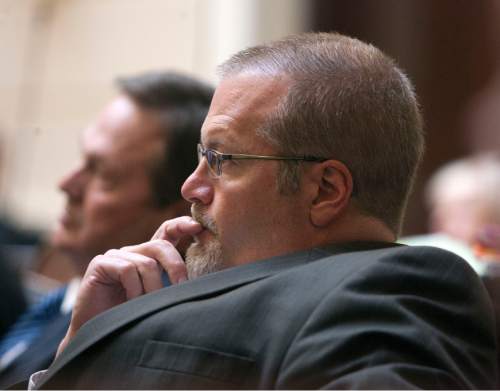This is an archived article that was published on sltrib.com in 2016, and information in the article may be outdated. It is provided only for personal research purposes and may not be reprinted.
A legislative committee on Tuesday advanced to the full Senate a bill that seeks to abolish the death penalty in Utah.
SB189 would eliminate the punishment for first-degree felony aggravated murder effective May 10, 2016. It would not change the course of any capital case currently being prosecuted, nor prevent Utah from carrying out the executions of the nine men currently on the state's death row.
In his presentation to the committee, bill sponsor Sen. Steve Urquhart, R-St. George, said there are myriad reasons for Utah to halt its use of capital punishment. Those include the high costs of prosecution and appeals, the failure of the punishment to serve as a deterrent to crime, the reality that some are wrongly convicted and executed, and the decades of pain victims' families suffer waiting for executions to occur.
In Utah, three of the nine death-row inmates have been there for nearly 30 years.
"To have those families have the expectation that someone is going to be put to death and it takes such a long time … I think that's abusive," Urquhart said.
Overall, he said the death penalty is ineffective and Utah should move away, as other states have, from a punishment that can't be reversed.
"Government shouldn't be in the business of killing" said Urquhart, who previously supported the death penalty. "It's wrong."
SB189 passed on a 5-2 committee vote and now heads to the full Senate for consideration.
If the bill were to become law, the crime of aggravated murder would be punishable by two possible sentences: Life without the possibility of parole or 25 years to life.
Sens. Lyle Hillyard, R-Logan, and Todd Weiler, R-Woods Cross, voted against the bill, saying they believe death that is a fitting punishment for some crimes.
Hillyard said he likes that in Utah victims have rights and that families should have the right to express their preference to prosecutors about seeking, or not seeking the death penalty.
"I think they should have that right," he said. "If we repeal this, they don't have that choice."
Utah attorney David Shapiro, who has represented defendants in capital cases spoke in favor of the bill, echoing the reasons of others, but also sharing a unique perspective.
Shapiro's parents, Lawrence and Glenna Shapiro, were murdered in a homicide-arson in their Paradise Valley, Ariz., home. The perpetrator was caught and charged with capital murder, but four years later, Shapiro said, the case is not even close to a trial.
"I know that in Arizona, much like in Utah, the average person spends on death row, a generation," said Shapiro, as his brother and law partner, Steven Shapiro, looked on. "That is a grueling, impossible position for a victim to be in."
Shapiro said he believes life without the possibility of parole would be sufficiently harsh sentence for his parents' alleged killer.
"And the case is over and there is nothing more do to … and he can't hurt anybody else," Shapiro said. "That to me honors my parents' memory."
Maryann Christensen of the Utah Eagle Forum, disagreed with Shapiro, saying that the death penalty does honor the lives of those slain by "heinous murderers.
"By not executing the death penalty, it cheapens the value of their lives," she said.
Christensen also handed lawmakers several pages worth of quotes and commentary from legal experts who support capital punishment, including one that said the risk of executing an innocent person should not serve as grounds to eliminate the punishment.
"Yes, it should," Urquhart said responding in his closing remarks.
Utah last carried out the death penalty in June 2010, when Ronnie Lee Gardner was executed by firing squad for the 1984 murder of Michael Burdell, a Salt Lake City lawyer, during a failed escape attempt from the 3rd District courthouse.
Statewide data from the Utah State Courts show prosecutors have filed capital aggravated murder charges against 58 defendants since 2010. Only one case — that of Doug Lovell whose original 1985 capital case was retried in 2015 — resulted in a capital conviction and a death sentence.
Nationally the use of the death penalty is on the decline and polling shows that most Americans now prefer the alternative, life without the possibility of parole sentence.
A 2012 study by Utah fiscal analysts found the state spends — from prosecution, to appeal and execution — about $1.6 million more per death-row inmate. Counties bear the brunt of those costs.



